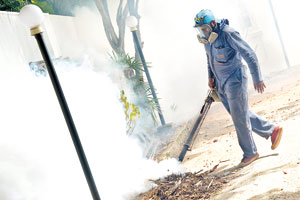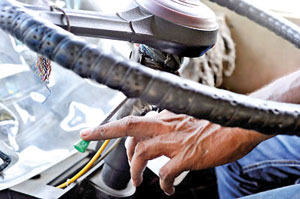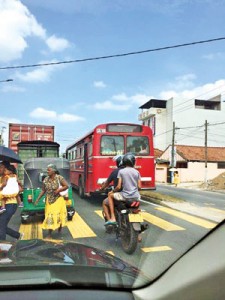Letters
View(s):A course of action that could save several hundred potential dengue patients
 I live in Dehiwela, which is a high risk area for dengue fever. The usual practice of the health authorities when a patient suffering from dengue fever is admitted to a hospital is; to notify the MOH of the area in which the patient resides. Officials from the MOH office come and inspect the house and also the surrounding premises and neighbourhood to detect places where mosquitoes breed. I believe that in many instances the houses and the surrounding premises are free from mosquito breeding places.
I live in Dehiwela, which is a high risk area for dengue fever. The usual practice of the health authorities when a patient suffering from dengue fever is admitted to a hospital is; to notify the MOH of the area in which the patient resides. Officials from the MOH office come and inspect the house and also the surrounding premises and neighbourhood to detect places where mosquitoes breed. I believe that in many instances the houses and the surrounding premises are free from mosquito breeding places.
Then how did the patient contract the disease? Very often it is from the workplace, or if it is a student it is either from the school or a tuition class. Therefore I suggest that in addition to examining the houses and gardens, the work places and schools/tuition classes attended by such patients, and also if possible the places the patient had visited frequently (about 10 days before contracting the disease) should be inspected.
If such a course of action is taken, I am of the view that several hundred potential dengue patients could be saved, and mosquito breeding places eradicated.
G. Buddhadasa
Via email
The incessant sounds of air horns will soon make us deaf
 The government some time ago made a big fuss about air horns fitted on to mainly buses and heavy vehicles. But these regulations have died a natural death.These air horns are noise pollution to the max.This menace starts as early as 5 a.m. daily and goes on upto even 10 p.m.
The government some time ago made a big fuss about air horns fitted on to mainly buses and heavy vehicles. But these regulations have died a natural death.These air horns are noise pollution to the max.This menace starts as early as 5 a.m. daily and goes on upto even 10 p.m.
I live in an apartment by the side of Highlevel Road in Colombo 6 and these air horns are a real curse.We are partially deaf and suffer constant headaches as a result.
Why are the authorities deaf to our sufferings?
Do these stupid drivers think they are chasing wild elephants on our highways? Some times with buffer to buffer traffic they keep tooting their air horns. The authorities must put a stop to this. Before long we will be totally deaf and end up with brain tumors.
The authorities should get all these air horns removed from buses and all heavy vehicles.Give a cut-off date and if they don’t comply, their route licences should be cancelled. Most of the time there are traffic cops on the roads when these horns are blaring away, but they appear to be unaware that it is an offence to use these kinds of horns.
It is high time the IGP cracks down and ensures that action is taken to stop this nuisance.
Brig. Neville Fernando
Colombo 6
Service providers are simply ripping off Internet users
There is probably no other product or service that is subject to such extreme price variations as Internet data. The cost of data, even from the same Internet Service Provider (ISP) can vary over an excessively wide range. Currently, the price of one GB of data falls somewhere between Rs. 50- and Rs.250 without taxes, levies and cess. When these are added, the cost to the customer would range from about Rs.75 to Rs.375 per GB, which indicates a whopping five-fold differential between prices for the same commodity!
(All references here are to ‘Peak Hours’ data as the majority of people find it impractical to sit before a computer between midnight and 6 a.m.)
There is another odd feature noticeable about Internet data packages. Usually, when things are purchased in larger quantities the unit price tends to decrease a little, but that is not the case here. Often, the price of data per GB is slightly higher for the bigger packages!
This state of affairs does not make any sense at all. What is happening is that the service providers are simply ripping off the Internet users and there is apparently no one to look after the latter’s interests. Both the TRCSL and the Consumer Affairs Authority turn a blind eye to this. Therefore, to protect the interests of the public it is imperative that a responsible authority step in and bring some order and control to the ISPs’ logic defying pricing practices.
Incidentally, in respect of postpaid packages, consumers should be aware that not utilizing the entirety of the allotted GB is less wasteful than having to pay high prices for additional data they may be compelled to purchase later. What is meant by this is that if someone has signed up for a 30GB per month package and utilizes just 25GB he is wasting only a little money. On the other hand, if that person has signed up for a 20 GB package, but later purchases an extra 5GB then he is wasting a lot of money. That is because the ‘Extra GB’ is prohibitively priced.
All too often it happens that you exhaust your package long before the month comes to an end and then you find yourself in a pretty awkward situation. Therefore, it is better to go in for a larger package than you think you will need and let a few GB go unutilized than run out of your monthly quota midway and be forced to buy ‘Extra GB’ at absurd prices.
Anyway, the best solution would be strict regulation and price control of Internet data as presently the ISPs are enjoying unfettered freedom to set the cost of service as they wish at the expense of the poor public who are at their mercy.
C. Sugumar
Kandy
IQ test for those who aspire to be parliamentarians
I refer to the ‘Thoughts from London’ – column in the Sunday Times of January 1, regarding the educational qualifications for parliamentarians and other public officials.
I made a suggestion many years ago that any person contesting any type of election should pass an IQ test and score a minimum of 70 out of 100.
Education is important but cannot be enforced as anyone can contest but if an IQ test is conducted it will be fair by all.
A. Ahmed
Colombo 5.
Little facilities at the Fort Police station
The Fort Police Station in the years gone by occupied a most prestigious building which had its branches like the Crime, Traffic and administration given priority and with the signalmen’s barracks. Development commenced and now the Police Station has no permanent building and adequate space for offices, parking and even for the public to meet police officers to air their grievances.
All governments appear to have given the Police Department step- motherly treatment while the armed forces occupy well equipped buildings. A department like the Police which is called upon to work round the clock with the minimum facilities is treated with scant respect. It is time that the Minister of Public Order looked at these facilities before talking of ‘mega developments’. Has the government lost its priorities? While Police personnel are disappointed as disciplined officers they cannot go on ‘demonstrations’. They are completely ignored. Why?
F.N. de Alwis
Via email
The ‘uncle’ syndrome: Can someone enlighten me?
What is this predilection among the SINHALESE (the emphasis is mine, as I have noticed that this practice is not very prevalent among the Tamils, Muslims, Burghers here), which includes the cultured Sinhalese, as well as the school drop-out bus conductor and three-wheel driver, to address all strangers, be it the beggar, the itinerant odd job man, the road sweeper or Municipal labourer, or other older person as “Uncle”. That older person could be a retired Doctor, Professor, Lecturer or other academically highly acclaimed person, and he feels highly insulted and mortified (and rightly so) to be equated with a beggar or road sweeper.
Someone, somewhere, has instilled the idea in the Sinhala mind-set, that it is being respectful to address an (or should I say “any”) elder person, as uncle.
This writer was witness to an incident where a retired Doctor, in his twilight years, walked into a shop (the local “sillara kade”) late one evening, attired in a sarong and tailed out shirt, (he was probably living a few doors away) and the shop salesman addressed him as “Mokakda Uncle one?” The Doctor promptly told him, in good, decent Sinhala, “I am not your Uncle, because I am not your Mother’s brother, and if I had a choice, I’d rather NOT be your Uncle. I am a retired Doctor, living a few doors away and I want a loaf of bread.”
The writer is of the view (I am willing to stand corrected) that this predilection has more to do with a severe “Inferiority complex” (or should it be “superiority complex”. I would welcome a clarification from a psychologist), where the ‘addresser’ feels it is below his dignity to call the ‘addressee’ as Sir or Mahaththaya, than with a desire to be ‘respectful’. Surely the dumbest salesman can differentiate between an itinerant/beggar and a more educated citizen, notwithstanding his attire at that moment.
I recall my father telling me “Son, if you address someone as “SIR” does NOT mean that that person is someone of eminence, but it reflects the culture of respect, good manners and mores, in which you have been nurtured and brought up.”
I wish this letter would get published, not for the edification of the general public, but more to get a feedback from academics and psychologically astute persons, about my above take on this rather odious habit.
J. Appaswamy
Via email
Some qualified doctors do not practise medicine but dabble in mundane matters
It has been observed that many medical doctors in Sri Lanka are engaged in non-medical work. In order to obtain the first degree in Medicine, which is MBBS, a student has to spend not less than six years in the Medical College in addition to burning the midnight oil. In the first place to gain admission to a Medical College, one has to face stiff competition in the academic world.
Medical doctors are in scarcity not only in Sri Lanka but in most parts of the world and once a student passes out of the Medical College, the general public treat them with high respect and adulation due to the nature of their work. In the circumstances they have an enormous responsibility and they owe a debt of gratitude to the government as well as to the general public. The doctors must remember that the taxpayer has to spend not less than Rs. 10 million to train one doctor. Having considered the large sum of money spent on training and the tough competition they have to face, it is nothing but fair that they do the job that they were trained to do. Every doctor must remember that he has deprived another student who may be willing to engage in the medical field.
One can find a number of medical doctors engaged in politics in the present Parliament. It is common knowledge that no academic qualifications are required to be a member of Parliament, and in such a situation for doctors to engage in non-medical duties cannot be condoned. A student who is unwilling to look after the patients should not enter the Medical College by depriving another who is going to practise medicine and not do any other type of work. I recall when my son wanted to do medicine, I asked him whether he is willing to get up at midnight and rush to examine a patient seriously ill. I also advised him to be fully committed to a patient’s welfare forsaking his own comforts. To my great satisfaction he is now a doctor actively practising medicine.
If you look at the Ministry of Health and its provincial offices you will notice a large number of Medical Doctors engaged in ‘pen pushing’ – dealing in signing papers and similar mundane jobs which can be handled by administrative officers or management officers.
We in Sri Lanka need a large number of doctors to fill in the vacancies in our hospitals, particularly in rural districts. When doctors take up non-medical duties naturally the vacancies remain unfilled. In order to avoid this situation, I would suggest that all doctors passing out of Medical Colleges sign a bond to practise medicine for a minimum period of five years.
Prem Goonawardena
Piliyandala
What criteria was used to name Kandy Municipality the best local body?
Kandy has been adjudged the best Municipality 2016 according to banners seen in the city.
This award has been earned sans City fathers – the Mayor and others members who had to vacate office on the dissolution of the council. It is requested that the following questions be answered by the Commissioner and others in the know.
* If the Kandy Municipality is the best, what is the worst local body?
* What is the criteria and guidelines for the selection of local bodies?
* The award has been won during the time when there was no Mayor or councillors so what is the purpose of electing a Mayor and council members who are paid with the ratepayers’ money?
* The selection as ‘best’ is questionable. – Take the example of the Kandy Public Library with a historical record and a collection of books worth millions of rupees that was subject to fire a decade ago and is still not repaired. Furthermore it has been partially functioning with a temporary librarian for the last 12 years.
* Isn’t it time that serious thought was given to the multiplication of members of local bodies – viz- Delimitation Commission and its long overdue report?
* Is it necessary to have some 5,000 local representatives of local bodies for an area of 25,000 sq. metres-that is Sri Lanka.
Lastly congratulations to the current commissioner for having increased the annual rates without an improvement of the facilities – for example land was provided by late President William Gopallawa for construction of a public toilet and this was done; but since 2016 it is being utilised for other purposes.
S.G. Mapalagama
Kandy
Save us from this dog menace
The stray dog menace has become unbearable around Anderson Flats in Narahenpita, especially during nights. Sometimes they howl in long shrill sounds or fight among themselves causing sleepless nights to the elderly and the sick people or disturb students who are preparing for their exams. It appears that the present system of catch, neuter and release does not seem to work here with the stray dog population increasing day by day.
In addition aggressive dogs give chase to cyclists and motor cyclists forcing them to do acrobatic manouvres to avoid being bitten.
Will the authorities concerned do the needful to arrest this situation please?
P.Vivekanandan
Via email
Some suggestions to ease traffic blocks in Kandana
 I am a resident of Kandana and this is about the traffic situation during the festive season just past.
I am a resident of Kandana and this is about the traffic situation during the festive season just past.
The traffic build-up was really bad, with the Church feast attracting thousands of people from various parts of the country who had come to get the blessings of St. Sebastian. Whilst the Kandana police was out there during peak hours, there was no real effort taken to curb traffic offenders. A good example is buses, three wheelers and trucks driving on the right side of the road and adding to the congestion (see attached photo taken around noon).
There are bikes and three wheelers which get onto the pavements even close to the yellow-line crossings (for example near St. Anthony’s Food Kandana) before the Church road, and the poor pedestrians have no place to walk. This is an area where there are lots of elderly people walking to buy their day-to-day requirements and it is sad to see that these drivers don’t respect even such senior citizens.
A few suggestions which could help this congestion:
1. Increase the number of traffic officers
2. Man the Church road Junction at all times (peak hours) and not only the main junction. This is totally ignored at times (even a traffic light system at some stage will help).
3. Have a few additional mobile officers around the pavement areas on the seaside during peak hours
4. Charge offenders using the wrong side of the road, pavements, etc. so that at least they will not repeat it
5. Put barriers near crossings (on the pavement) to prevent vehicles from using the pavement, for example iron poles up to say around 3 feet. This may be long term but is very essential.
Hope we will see some improvement of this congestion in the coming days/weeks.
Ishan de Silva
Kandana
| Letters to the Editor ‘Letters to the Editor’ should be brief and to the point. ‘Letters to the Editor or editor@sundaytimes.wnl.lk. Please note that letters cannot be acknowledged or returned |


